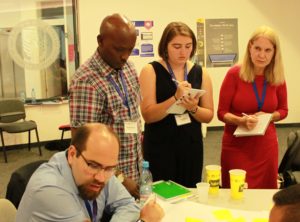By Sarah Fizer
I have previously defined resilience as the ability to keep moving forward and to remain strong in the face of adversity. This is a very individualistic approach to the term, as I have only used it in regards to an individual or a small group of people. The concept of resiliency is often used when trying to uplift the morale of a group, to remind themselves and those around them that they are strong and will not back down regardless of the obstacles that may stand in their way.

However, this term does have the potential for a broader definition to help move forward the peacebuilding process. Recently we were shown another definition of resiliency in relations to local governance, and this definition describes resilience as the ability of community actors and local governance structures to collectively cope and recover from various external stresses. I really liked this concept of a collective process for recovery, to which the people and the governance structures (who sometimes causing the stresses) can move forward together.
The effectiveness of local governance systems plays a huge role in creating an inclusive environment for the voices of the people to be heard and their ability to act in crisis. Combining local governance with the concept of resilience will strengthen local communities and create a sense of local responsibility to problem solving.

